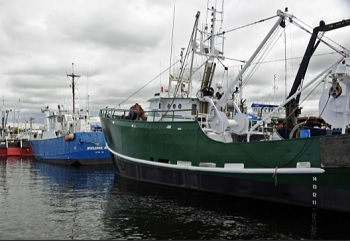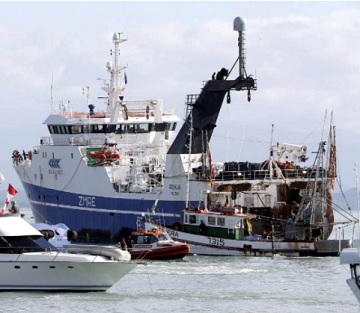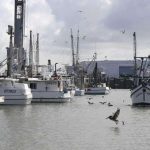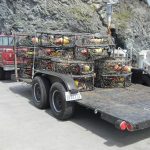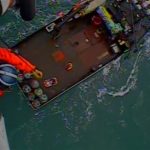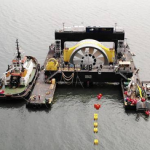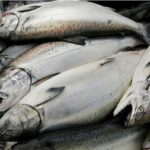U.S. Rep. Jeff Van Drew, D-2nd, joined Alaskan Rep. Don Young, a Republican, to introduce a bill reauthorizing the Magnuson-Stevens Fishery and Conservation Management Act on Thursday. But the bill would make changes to the law that some environmentalists fear may result in taking more fish than is sustainable. Among other things, the reauthorization would change how fishery councils determine fishery stock rebuilding timeframes, giving the public a greater role in the development of science and fishery management plans. In a statement, Van Drew said H.R. 3697 “ensures that we have healthy fisheries, keep anglers in the water and keep fishermen fishing.” >click to read< 09:10
Category Archives: Western Pacific
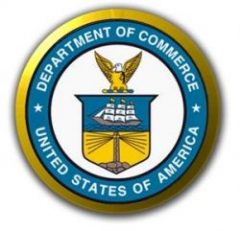
Commerce Department Announces 2021 Appointments to the Regional Fishery Management Councils
The U.S. Department of Commerce today announced the appointment of 31 members to the regional fishery management councils that partner with NOAA Fisheries to manage marine fishery resources. Established by the Magnuson-Stevens Fishery Conservation and Management Act, councils are responsible for developing region-specific fishery management plans that safeguard and enhance the nation’s fisheries resources. Each year, the Secretary of Commerce appoints approximately one-third of the total 72 appointed members to the eight,,, >click here to read< 15:03
Athearn Marine Agency Boat of the Week: 79.8′ Steel Raised Foc’sle Lobster/Crabber, 525HP Cat
 To review specifications, information, and 14 photos, >click here< , To see all the boats in this series >click here< 11:27
To review specifications, information, and 14 photos, >click here< , To see all the boats in this series >click here< 11:27
Athearn Marine Agency Boat of the Week: 82′ Steel Stern Dragger, 525HP Cummins KTA 19 M
 To review specifications, information, and 10 photos, >click here< , To see all the boats in this series >click here<11:46
To review specifications, information, and 10 photos, >click here< , To see all the boats in this series >click here<11:46
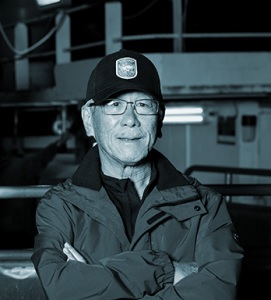
Coastal Job: Tuna Auction Manager
I was born and raised in a fishing family. I was swimming before I could walk, and at a young age, I could say the scientific and common names of Hawaiian fish. My family did not want me to go into commercial fishing, so I pursued marine sciences. But when I started working at the auction as its assistant general manager in 1979, something came over me. It was like, This is home. The first seven years, I took no vacation. I pulled 18-hour days and spent the night sometimes. Even people who’ve visited the auction don’t truly understand the depths of the operation. >click to read< 08:51
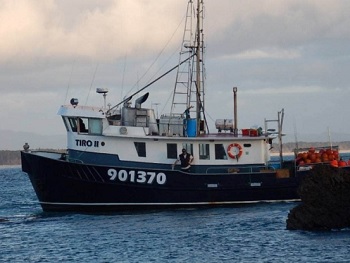
Fishing vessel with NZ links believed to be at centre of Fiji beheading at sea
The TIRO II is listed as belonging to Nelson-based company Ocean Vision Ltd on the Ministry for Primary Industries website, and is shown to be near Fiji on the international Marine tracking website. The longline tuna boat and its crew have been at the centre of a major search operation in Fijian waters since six men abandoned ship after the alleged beheading. Five of the six men who jumped overboard remain missing. >click to read< 08:48
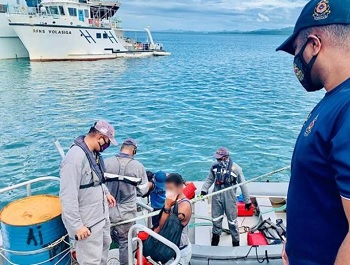
Crew members questioned after alleged beheading at sea onboard a tuna longliner
Six crew members from the vessel the F/V TIRO II jumped overboard during the reported “violent incident” on Monday. One person was aboard a life-raft, with the other five entering the water without lifejackets. The man in the life-raft has been found, with the Fijian Rescue Coordination Center releasing photos of the moment he was located on Wednesday. After taking on water Thursday night, FV TRIO II sank yesterday morning. photos, >click to read< 09:03
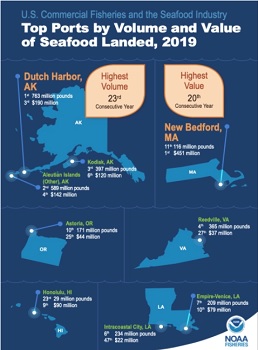
New Bedford is America’s number 1 fishing port for 20th straight year
The National Marine Fisheries Service released its annual report on the health of the nation’s fishing industry on Thursday,,, New Bedford ranked No. 1 for the value of seafood landed at its port for the 20th consecutive year in 2019, with $451 million worth of fish hauled in by its boats. That was up by $20 million compared with the year before, and far outpaced the second-ranked Port of Naknek, Alaska, which had $289 million worth of landings. NOAA officials said New Bedford’s dominance remains driven by sea scallops, which account for 84% of the value of all landings there. >click to read< 14:21
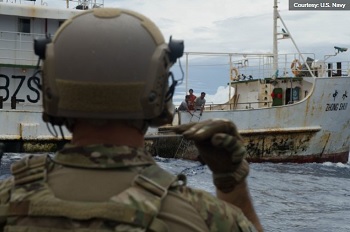
Hawaii’s Fishermen Are Worried About China’s Fleet. So Is The Military
Hawaii’s commercial fishermen and the U.S. military have a potential threat in common, China’s fleet of government-subsidized ships that has been straying into more distant waters in search of seafood and more influence. Local longliners have reported seeing increasing numbers of Chinese vessels near the islands, accusing them of overfishing and intimidation tactics. Sometimes the ships are fishing, sometimes they’re making their way into the eastern Pacific and sometimes they’re seemingly just sitting at sea, says Eric Kingma, executive director of the Hawaii Longline Association. >click to read< 08:05
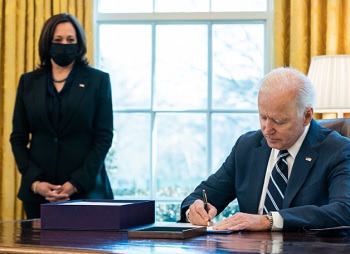
At-Sea Processors Association and Seafood Harvesters of America applaud “30×30” initiative
A Biden administration plan to conserve at least 30% of federal lands and oceans by 2030 is winning applause from the seafood industry, but questions abound elsewhere, raising political obstacles. Just about 12% of the nation’s land area is currently under some form of environmental protection, along with about 26% of the country’s ocean areas. The plan, an executive order issued by the Biden administration, and popularized as the “30×30” initiative, has won support from the harvester and processor sector of Alaska fisheries and others, (do you?) in that industry, but farmers and ranchers elsewhere remain skeptical. >click to read< 12:50
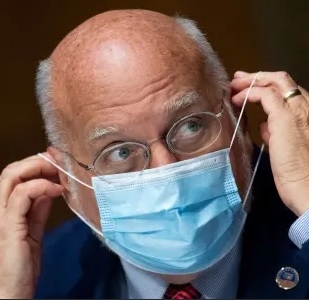
U.S. Commercial fishermen are frustrated by mask mandates from Maine to Alaska
Commercial fishing crews must be masked at all times, regardless of the number of people. The requirement stems from a Centers for Disease Control and Prevention rule issued in February saying all those on public transportation must be masked. The Coast Guard interpreted the rule to apply to all vessels, including commercial fisherman who sometimes work with crews of just three to five people. There are around 39,000 commercial fishermen in the United States. In a hearing with top administration health officials yesterday, Sens. Lisa Murkowski (R-Alaska) and Maggie Hassan (D-N.H.) brought this up. saying they’ve heard deep frustration from fishermen who argue that wearing a mask while doing their work is unsafe. >click to read< 12:43
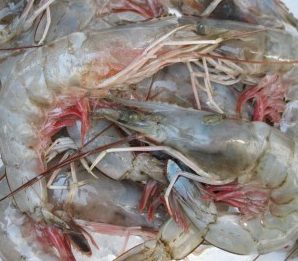
Its National Shrimp Day! The Incredible Health Benefits Of Eating This Seafood
National Shrimp Day is celebrated each year on May 10 to recognize America’s favorite seafood. It is estimated that an average American consumes around 15.5 pounds of seafood annually, out of which 4 pounds is shrimp. There are more than 2,000 different species of shrimp found all over the world from the tropics to the Antarctic Ocean. The most common shrimp species in the United States include Gulf Brown Shrimp, Gulf Pink Shrimp, and Gulf White Shrimp. >click to read< 08:33
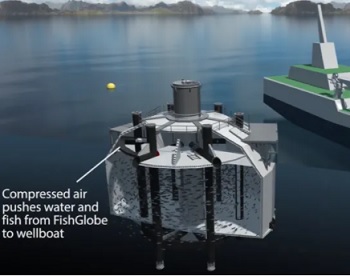
The last cowboys – a replay of the story of cattle in the American West
Norway, a country less than a quarter the size of Alaska, is on pace to bring 1.2 million tonnes of salmon to market this year, and the technologists in that country are talking about the potential to grow their production to 3 million tonnes per year by 2030. Chile, Scotland, the Faroe Islands, and Canada are all significant producers with lesser production in Australia, New Zealand, Iceland, France, Ireland and Finland. Meanwhile, land-based, recirculating aquaculture systems (RAS) farms are threatening to lead to an explosion in salmon aquaculture almost everywhere. To truly understand the threat these farmers pose to the future of one of Alaska’s oldest and still largest industries,,, >click to read< 08:52
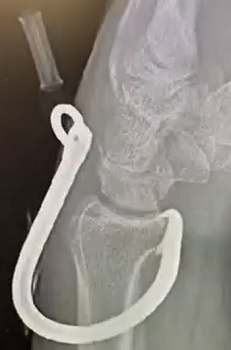
Kona fisherman snagged by large hook credits Coast Guard with saving his life, shows his gratitude
Kenton Geer says he was hauling gear aboard his boat the F/V Vicious Cycle last Tuesday when he was snagged by a massive hook and dragged across the deck. The 39-year-old commercial fisherman has worked on the water more than two decades. He says without the help of the Coast Guard he might not have made it back to shore alive. “I think that there was a real possibility, I could have bled to death,” Geer said. “Or be talking about not having a hand.” A helicopter trip to the hospital is a ride no fisherman ever wants to take. After five days at Honolulu’s Queen’s Medical Center  and two surgeries, the fisherman is back in Kona and on the mend. But before going home, he made an important stop to thank the Coast Guard crew who saved him. >video, click to read< 14:50
and two surgeries, the fisherman is back in Kona and on the mend. But before going home, he made an important stop to thank the Coast Guard crew who saved him. >video, click to read< 14:50
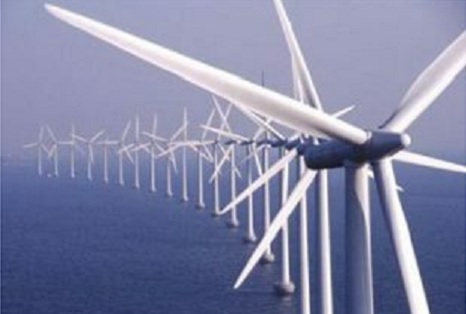
Does Biden have an ocean policy? – Climate change and ocean industrialization!
Days after taking office the president signed an executive order to fully conserve 30 percent of the nation’s land and 30 percent of its waters by 2030. One of the world’s strongest supporters of 30×30 is special presidential Climate Envoy John Kerry. Biden also pledged the U.S. will generate 30 gigawatts of offshore wind by 2030.,,, To keep its quickly-evolving ocean strategy salty, the White House has put some top marine people in charge. They’ve brought in Jane Lubchenco, Climate Czar Gina McCathy, nominated NOAA Chief Scientist Rick Spinrad to lead NOAA, and Monica Medina as assistant secretary of State for Oceans, Environment and Science. >click to read< 10:49

Fishing industry unimpressed with Biden Harris’s NOAA/NMFS climate crisis notions. (Offshore Wind Farms, either!)
President Biden ordered NOAA to collect information from a wide range of groups on increasing the resilience of fisheries as part of his plan to address climate change and to protect 30% of U.S. ocean areas by the year 2030. The NOAA directive is included in the sweeping executive order Biden signed his first week in office that made “the climate crisis” a centerpiece of his presidency. “Fisheries, protected resources, habitats and ecosystem are being affected by climate change,” acting NOAA Fisheries chief Paul Doremus said at the beginning of yesterday’s conference call. >click to read< 07:55
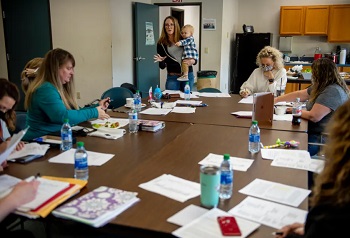
From Oregon to Massachusetts, fishermen’s wives associations are the backbones of their communities
In spring 2020, the fishing community of Newport, Oregon, shuttered along with the rest of the country. A coronavirus outbreak at a local Pacific Seafood processing plant left fishermen sitting on docks with no buyers for their Dungeness crabs, while restaurants closed and families found themselves housebound. That’s when Taunette Dixon and her organization, the Newport Fishermen’s Wives, stepped in.,,, In Massachusetts, the Gloucester Fishermen’s Wives Association was founded in 1969. “We were shore captains,” said Angela Sanfilippo. “We would make sure when the boats came in, they’d get everything they needed so they could go back out the next morning at 2.30. The wife would be responsible to make sure these things happened. As their wives, we knew more than them.” >click to read< 11:32
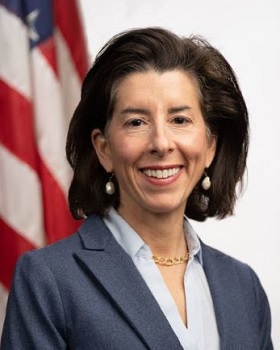
Gina M. Raimondo Sworn in as 40th U.S. Secretary of Commerce
Gina M. Raimondo was sworn in as the 40th U.S. Secretary of Commerce. Secretary Raimondo was sworn in by Vice President Kamala Harris after a bipartisan vote of 84-15 in the United States Senate. In her role as Secretary of Commerce, Raimondo will lead a key agency focused on promoting economic growth, >click to read<11:20
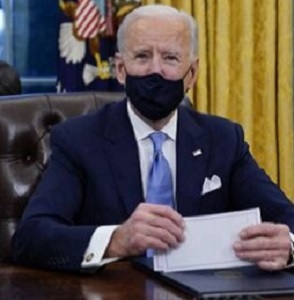
‘Mask police’: Commercial fishermen, watermen required to wear masks on boats via Biden, Coast Guard COVID orders
The U.S. Coast Guard is requiring masks be worn on commercial fishing boats and other vessels as part of President Joe Biden’s executive orders mandating face coverings on federally regulated transportation vehicles.,, Now, they are also going to be enforced on watermen and those working on fishing boats, according to the Coast Guard. U.S. Rep. Andy Harris, R-Md.-1st, said mandating the mask on watermen and fishermen working outdoors is burdensome, goes against the science of how of and where COVID is spread and could require masks to be worn at all times on boats, including while sleeping. >click to read< 19:10
Congressman Harris Asks for Clarification on Mask Mandate for Small Craft Fishing Vessels – The Coast Guard has issued guidance that all commercial fishing vessel occupants will be required to wear masks, and that they will enforce this mandate. >click to read<
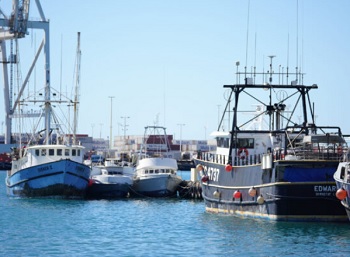
Hawaii Longline Association Takes Action To Fight Poor Conditions And Human Trafficking
Eric Kingma, HLA executive director, says the local longline fleet has already taken several steps to ensure Hawaii’s fishermen are treated humanely. While he took issue with some of the findings of the AP articles, he acknowledged it sparked a needed conversation about how foreign fishermen are treated. “That report did damage to the reputation of our fishery,,, “Certainly, we took the issue very seriously and responded with our own review of crew, captains and vessel owners.” He said HLA’s internal review did not find any evidence of human trafficking or forced labor in the longline fleet, which is made up of about 140 vessels and nearly 700 foreign fishermen. >click to read< 08:29
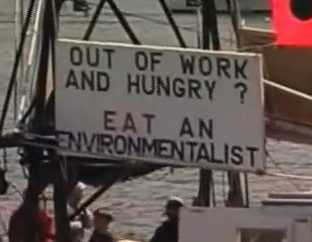
6 Ocean Priorities for the Biden Administration from the Environmentalist
Since President-elect Biden was voted into office last November, he and his team have been sharing what they want to accomplish in their first 100 days in office.,, In the midst of any political transition, it is easy for environmental issues to be pushed aside in the name of more “urgent” issues. Fortunately, the new administration has given us promising signals that environmental action is high on their to-do list. Here are six things that must be prioritized in the coming weeks and months,,, >click to read< 09:48
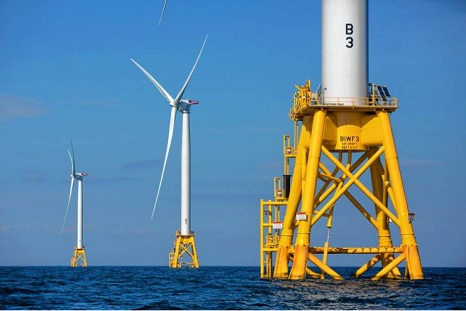
As Commerce Secretary, Raimondo to play key role in offshore wind.
In the selection of Gina Raimondo as the next U.S. Secretary of Commerce, the offshore wind industry would get a champion in Washington. What influence she could bring to bear for the emerging energy sector remains to be seen, but if confirmed to her new position in the Biden cabinet, Raimondo would oversee federal fisheries regulators who have raised some of the concerns about potential negative impacts of erecting what could be many hundreds of wind turbines in the ocean waters off southern New England. >click to read<09:45
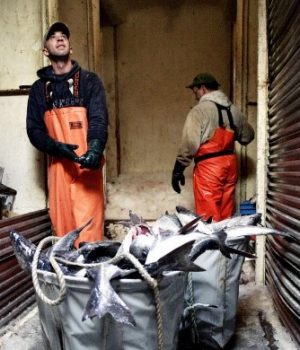
Stocks head for weekly loss as economy’s coronavirus pain deepens – Seafood industry hit hard
A federal report says the coronavirus pandemic has taken away about a third of the commercial fishing industry’s revenue. The National Oceanic and Atmospheric Administration says revenues from catch brought to the docks by commercial fishermen fell 29% over the course of the first seven months of the year. The report says revenues declined every month from March to July, including a 45% decrease in July. The NOAA report says the seafood industry at large has been hit hard by restaurant closures, social distancing protocols and the need for safety measures. >click to read< 09:15
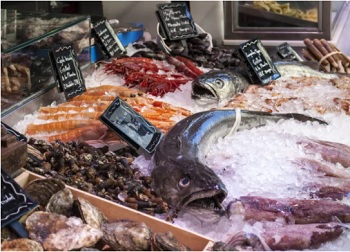
Deadline to Apply for Seafood Trade Relief Program Coming Up
“U.S. fishermen affected by retaliatory tariffs need to file an application for this program by Friday, Jan. 15,” said Richard Fordyce, Administrator for USDA’s Farm Service Agency (FSA). “We still have funding available, and these direct payments will help them recover from the effects of retaliatory tariffs on their ability to make a living.” STRP is available for the following types of seafood: Atka mackerel, Crab (Dungeness, King, Snow, Southern Tanner, Flounder, Geoduck, Goosefish, Herrings, Lobster, Pacific Cod, Pacific Ocean Perch, Pollock, Sablefish, Salmon, Sole, Squid, Tuna, Turbot. To apply, visit farmers.gov/seafood or call 877-508-8364. >click to read< 12:20
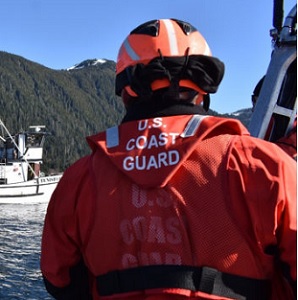
Coronavirus: Coast Guard offers extension on credentials, medical certificates, and course approvals
Coast Guard officials have announced an extension of merchant marine credential endorsements, medical certificates and course approvals to meet challenges caused by the global novel coronavirus pandemic. At the same time, the Coast Guard advised that due to these changes there may be a backlog in the processing of credentials and course approvals, especially near the end of the extension dates.,, Under the Coast Guard’s current statutory authority, the expiration dates of merchant mariner credentials may be extended for no more than one year. >click to read< 14:34
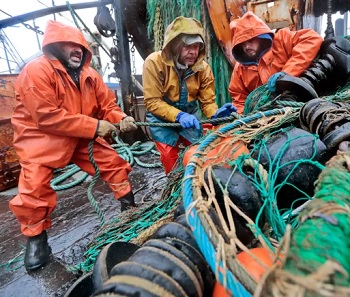
Legislation to help next generation of young fishermen passes in Congress
Congress passed bipartisan legislation on Dec. 20 that would establish a national program to train and educate the next generation of commercial fishermen. It must be signed by President Donald Trump before becoming law. The Young Fishermen’s Development Act, H.R. 1240, would create $2,000,000 in yearly grant funding, which would be dispensed to various organizations to provide mentorship and learning opportunities to fishermen just starting in the industry. >click to read< 12:19
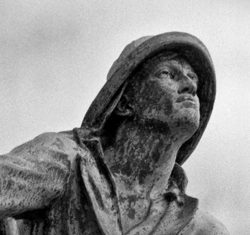
As the New Year is on the horizon, please consider implementation of a U.S. Fish Bill
Greetings to all commercial fishermen, fish processors, equipment suppliers, politicians, and citizens, that are interested and supportive of creation of a U.S. Fish Bill. I mentioned it in a letter to the editor, Letter: Can a fish bill, like Farm Bill, aid fishermen? on I have tried to get our local politicians to help me draft a U.S Fish Bill, which would serve the U.S Fishing Industry, like the U.S. Farm Bill does for the agriculture industry. >click to read< Sam Parisi, Gloucester 09:11
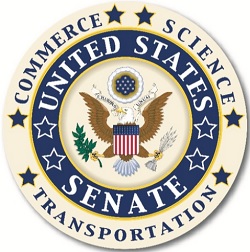
Report on Fishery Failures: Urgently Needed Disaster Declarations Act, S. 2346
Purpose of the Bill: The purpose of S. 2346, the Fishery Failures: Urgently Needed Disaster Declarations Act, is to clarify and expedite the disaster declaration process, establish certain deadlines for the National Oceanic and Atmospheric Administration (NOAA), reduce delays, and clarify eligibility for assistance to ensure that charter, recreational, and Tribal fishers have access to disaster funds. Additionally, the bill would provide employment opportunities for fishery employees displaced by a fishery disaster by prioritizing their hiring to undertake restoration, conservation, and other fishery rebuilding activities funded by disaster relief funds. >click to read< 09:22







